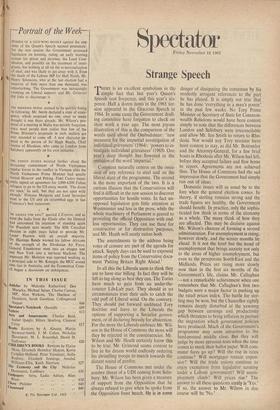Strange Speech
rr HERB is an excellent symbolism in the 1 simple fact that last year's Queen's Speech cost fivepence, and this year's six- pence. Half a dozen items in the 1965 'Ver- sion appeared in the Gracious Speech in 1964. In some cases the Government draft- ing committee have forgotten to check on their work a year ago. The most joyous illustration of this is the comparison of the words used about the Ombudsman : 'new measures for the impartial investigation of individual grievances' (1964): 'powers to in- vestigate individual grievances' (1965). One -year's deep thought has flowered in the omission of the word 'impartial.'
Comment naturally centres on the omis- sion of any reference to steel and on the liberal slant of the programme. The second is the more important of ,the two. It is a curious illusion that the Conservatives will find it difficult in the new session to discover opportunities for hostile votes. In fact un- opposed legislation gets little attention at Westminster and less in the press, while the whole machinery of Parliament is geared to providing the official Opposition with end- less opportunities. They can use these for constructive or for destructive 'purposes, and Mr. Heath will surely ration both.
The amendments to the address being votes of censure are part of the agenda for attack. Supply days can be used to expound items of policy from the Conservative docu- ment 'Putting Britain Right Ahead.'
In all this the Liberals seem to think they are to have star billing. In fact they will be left to tag along as best they can. The Tories have much to, gain from an under-the- counter Lib-Lab pact. They should in no circumstances trim their sails to catch the odd puff of Liberal wind. On the contrary. They should put forward undiluted Tory doctrine and leave to the Liberals the options of supporting a Socialist govern- ment, or of declaring bravely for abstention. For the more the Liberals embrace Mr. Wil- son in the House of Commons the more will they be rejected in the constituencies. Mr. Wilson and Mr. Heath certainly know this to be true. Mr. Grimond seems content to live in his dream world endlessly ordering his dwindling troops to march towards the distant sound of gunfire.
The House of Commons met under the sombre threat of a UDI coming from Salis- bury. Mr. Wilson has been given a measure of support from the Opposition that he always refused to give when he spoke from the Opposition front bench. He is in some danger of dissipating the consensus by his modestly arrogant references to the part he has played. It is simply not true that he has done 'everything in a man's power' in the past few weeks. No Tory Prime Minister or. Secretary of State for Common- wealth Relations would have been content simply to note that the differences between London and Salisbury were irreconcilable and allow Mr. Ian Smith to return to Rho- desia. Nor would any Tory minister have been content to stay, as did Mr. Bottomley and the Attorney-General, for a few brief hours in Rhodesia after Mr. Wilson had left, before they accepted failure and flew home to report. Agreements are not achieved thus. The House of Commons had the sad impression that the Government had simply run out of ideas.
Domestic issues will as usual be to the fore when the general election comes. In theory, if sterling remains strong and the trade figures are healthy, the Government should benefit. In practice, only the sophis- ticated few think in terms of the economy as a whole. The many think of how they are affected. This may be decisive against Mr. Wilson's chances of forming a second administration. For unemployment is rising, however slowly, and the winter months lie ahead. It it not the level but the trend of unemployment that brings anxiety not only to the areas of higher unemployment, but even to the prosperous South-East and the Midlands. Prices are rising more slowly now than in the first six months of the Government's life, claims Mr. Callaghan --not a remarkable achievement when one remembers that Mr. Callaghan's first two budgets were a major factor in pushing up the retail prices index. The battle for ster- ling may be won, but the Chancellor rightly remains deeply disturbed at the yawning gap between earnings and productivity which threatens to bring inflation to, partner the stagnation which government policies have produced. Much of the Government's programme may seem attractive to the hard-pressed middle class. But they will judge by more personal tests when the time comes to mark their ballot paper. Will com- muter fares go up'? Will the rise in 'rates continue? Will mortgages remain expen- sive'? Will the trade unions continue to enjoy exemption from legislative scrutiny under a Labour government? Will unem- ployment climb? Will prices rise? The answer to all these questions surely is 'Yes.' If so, the answer to Mr. Wilson in due course will be 'No.'














































 Previous page
Previous page